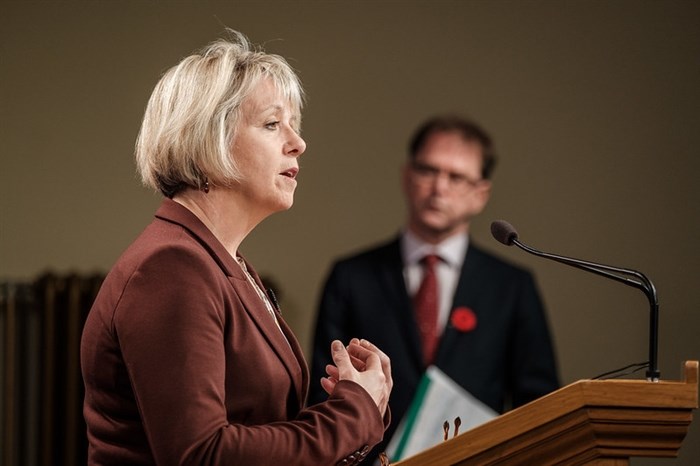
Provincial health officer Dr. Bonnie Henry speaks to reporters at a COVID-19 briefing, Thursday, Nov. 5, 2020 as Health Minister Adrian Dix looks on.
Image Credit: SUBMITTED / Province of B.C.
March 22, 2021 - 5:03 PM
More British Columbians in their 30s and 40s are being severely impacted by COVID-19, facing both hospitalization and death, as caseloads grow.
“It’s partly, as we're protecting more older people, there's more transmission in that younger age group,” B.C.’s provincial health officer, Dr. Bonnie Henry, said today, March 22.
“What we're seeing is increases again in the 20 to 39 year age group and up to age 59. Some of these are social transmissions, some of them are community transmissions where people are in crowded households, for example, and then some of them are work-related.”
As a higher number of people in that age group are affected, the probability that somebody is going to end up in the hospital at a younger age goes up, she said.
“Some of it is underlying illnesses and underlying risks in the population where we're seeing transmission,” she said.
Dr. Henry said among some of the outbreaks that were happening in First Nations communities, people of a younger age were much more likely to need hospitalization or critical care.
Also, up until quite recently B.C. was having ongoing challenges and outbreaks in shelters and in places like the Downtown Eastside. Within Interior Health, a Kamloops shelter also struggled with an outbreak.
“This is where the success that we've been seeing in pockets of communities with vaccination really hits home,” she said. “Three weeks after the push in the Downtown Eastside, we've seen a dramatic drop off, which is the good news, which is why we all need to keep hanging on for this next little while.”
Dr. Henry said she had conversations with her counterparts across the country, in the UK, this weekend and they found the same thing when it came to improvements after the vaccine was administered widely.
“Once we reach a certain level, we will see decreases in transmission, and from the AstraZeneca vaccine which they're using quite extensively in the UK, they had exactly the same if not better response in the community,” she said. “So these are the things that we need to focus on for getting through these next few weeks in particular, and then we'll start to see the impact of the amount of vaccine that we've been able to provide in the last few weeks and into April.”
The aim, she said, is to control the spread of the virus now. She also added that variants aren’t yet driving transmission, rather it’s been a slow but steady, replacement of regular cases with the variants of concern
“The cases are absolutely continuing up, but it's been a gradual increase, so I've never been a fan of the wave analogy, but you know we had a very high peak in our second wave prior to immunization being available, and now we're at a high level — a level that keeps me awake at night for sure — at a point where we are trying to target where transmission in our community is happening as best we can with the vaccines that we have available.”
Having this influx of the AstraZeneca vaccine gives health officials more flexibility to be able to do that and Dr. Henry said she thinks it's going to make a huge difference in three weeks.
“So we need to keep paying attention to our COVID safety plans,” she said, adding that she’s been in talks with WorkSafe B.C. and environmental health officers to ramp up workplace inspections and follow-ups and monitoring.
“If we can stop that transmission in those workplaces, that is also going to help us in this next period of time,” she said.
“And then I'm calling on all of us again to go back to our basics. This is not the time to be getting together, even with this small group of friends. This is not the time to have that wedding, put it off, put it off to the summer and we will be in a different place in a different post-pandemic place.”
She said we'll still be dealing with COVID, but we will be out of "the really challenging place that we are right now."
Between Friday and Saturday there were 556 new cases, from Saturday to Sunday an additional 598, from yesterday to today another 631 people. That amounted to 1,785 new people diagnosed with COVID-19 across the province, raising the total in B.C. to 92,571 in British Columbia.
Of the new cases, 84 are in the Interior Health authority. There are 5,290 active cases in the province, with 303 people in the hospital right now and 80 in critical care or ICU.
Another 16 people died from COVID-19 over the weekend, raising the death toll in British Columbia to 1,437.
To contact a reporter for this story, email Kathy Michaels or call 250-718-0428 or email the editor. You can also submit photos, videos or news tips to the newsroom and be entered to win a monthly prize draw.
We welcome your comments and opinions on our stories but play nice. We won't censor or delete comments unless they contain off-topic statements or links, unnecessary vulgarity, false facts, spam or obviously fake profiles. If you have any concerns about what you see in comments, email the editor in the link above.
News from © iNFOnews, 2021